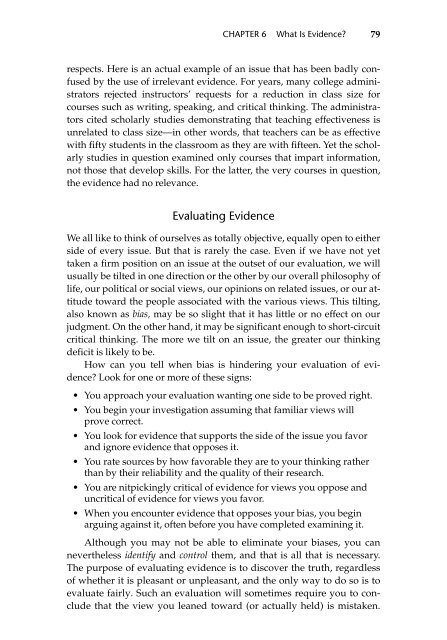Beyond Feelings
Beyond Feelings
Beyond Feelings
You also want an ePaper? Increase the reach of your titles
YUMPU automatically turns print PDFs into web optimized ePapers that Google loves.
CHAPTER 6 What Is Evidence?<br />
respects. Here is an actual example of an issue that has been badly confused<br />
by the use of irrelevant evidence. For years, many college administrators<br />
rejected instructors’ requests for a reduction in class size for<br />
courses such as writing, speaking, and critical thinking. The administrators<br />
cited scholarly studies demonstrating that teaching effectiveness is<br />
unrelated to class size—in other words, that teachers can be as effective<br />
with fifty students in the classroom as they are with fifteen. Yet the scholarly<br />
studies in question examined only courses that impart information,<br />
not those that develop skills. For the latter, the very courses in question,<br />
the evidence had no relevance.<br />
Evaluating Evidence<br />
We all like to think of ourselves as totally objective, equally open to either<br />
side of every issue. But that is rarely the case. Even if we have not yet<br />
taken a firm position on an issue at the outset of our evaluation, we will<br />
usually be tilted in one direction or the other by our overall philosophy of<br />
life, our political or social views, our opinions on related issues, or our attitude<br />
toward the people associated with the various views. This tilting,<br />
also known as bias, may be so slight that it has little or no effect on our<br />
judgment. On the other hand, it may be significant enough to short-circuit<br />
critical thinking. The more we tilt on an issue, the greater our thinking<br />
deficit is likely to be.<br />
How can you tell when bias is hindering your evaluation of evidence?<br />
Look for one or more of these signs:<br />
• You approach your evaluation wanting one side to be proved right.<br />
• You begin your investigation assuming that familiar views will<br />
prove correct.<br />
• You look for evidence that supports the side of the issue you favor<br />
and ignore evidence that opposes it.<br />
• You rate sources by how favorable they are to your thinking rather<br />
than by their reliability and the quality of their research.<br />
• You are nitpickingly critical of evidence for views you oppose and<br />
uncritical of evidence for views you favor.<br />
• When you encounter evidence that opposes your bias, you begin<br />
arguing against it, often before you have completed examining it.<br />
Although you may not be able to eliminate your biases, you can<br />
nevertheless identify and control them, and that is all that is necessary.<br />
The purpose of evaluating evidence is to discover the truth, regardless<br />
of whether it is pleasant or unpleasant, and the only way to do so is to<br />
evaluate fairly. Such an evaluation will sometimes require you to conclude<br />
that the view you leaned toward (or actually held) is mistaken.<br />
79


